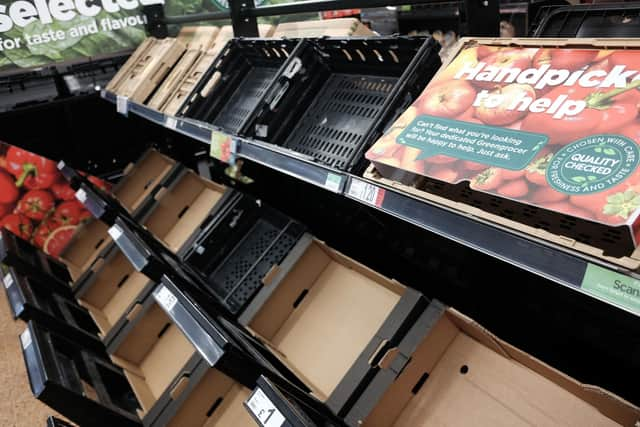Salad shortage is an alarm bell about abject failings in the way Britain manages its food - Andrew Vine
Those to blame are the Government and the supermarket chains, who between them have neglected to secure this country’s food supply whilst simultaneously choking the economic life out of the producers who put food on our plates.
None of us should fool ourselves that the shortages of tomatoes, cucumbers or peppers in the shops is solely a temporary annoyance that will sort itself out within a few weeks and be forgotten about.
Advertisement
Hide AdAdvertisement
Hide AdInstead, this should be regarded as an alarm bell about abject failings in the way Britain manages its food and the livelihoods of those who produce it.


There is no effective national strategy for ensuring a reliable and affordable supply of food, let alone safeguarding farmers and growers against being forced out of business by supermarkets who use their commercial clout to pay uneconomic rates for what they sell.
This has to be addressed by the Government, which needs to start listening to farmers instead of patronising them with assurances that their industry is valued, whilst at the same time failing to give enough support.
For evidence of this attitude towards an industry that is at the very heart of life in Yorkshire, one needs only to look at last week’s NFU conference. The Environment Secretary, Therese Coffey, appeared brusque and irritable with the audience, avoiding giving straight answers to questions before dashing off to catch a train.
Advertisement
Hide AdAdvertisement
Hide AdAs this newspaper revealed on Saturday, the shortages in the shops are to a great extent directly attributable to that lack of Government support. Growers can’t afford to heat their greenhouses and produce crops because of ruinously high energy prices, and they’ve received precisely zero help.
Supermarkets refuse to pay a fair price, and their greed for profits is aggravating shortages of produce from Europe caused by unfavourable growing weather.
What supplies are available are being sold on the continent where retailers have the sense – and decency – to pay a reasonable price for it.
A quick tour round social media shows pictures of fully-stocked shelves at supermarkets in France and Germany – even in Ukraine, a country fighting for its survival.
Advertisement
Hide AdAdvertisement
Hide AdIt surely must be a priority for any government to ensure that Britain has a healthy and thriving food industry. The war in Ukraine has only underlined the need for us to be as self-sufficient as possible, yet all the evidence points to farmers and growers being undermined.
Brexit may not be a central factor in the current shortages, but it is certain to cause problems for farmers in the next year or two, thanks to damagingly flawed trade deals struck with Australia and New Zealand over meat.
The then Foreign Secretary, Liz Truss, sold farmers down the river by opening our borders to cheap imports that threaten to undercut their livelihoods.
The deal was so skewed against British farming that one New Zealand newspaper expressed astonishment that we had given so much away, and described our farmers as “lambs to the slaughter”.
Advertisement
Hide AdAdvertisement
Hide AdThere could hardly be a more potent illustration of the Government’s neglect of agriculture.
It’s all part of the same picture of complacency on the part of ministers that farmers and growers will somehow survive and continue to produce, which is at best a denial of economic reality, and at worst an indication that they simply don’t much care what happens to agriculture.
Last week, the highly-respected former chief economist of the NFU, Sean Rickard, claimed the Government’s post-Brexit strategy on food was to import more produce from abroad and let our domestic industry shrink.
If he’s right, empty shelves are the symbol of how disgraceful and misguided a policy that is already proving.
Advertisement
Hide AdAdvertisement
Hide AdIt can only pile more pressure on farmers and growers already struggling in the face of rising costs for energy, feed and fertiliser, yet warnings from the NFU about the need for more Government support are going unheeded.
Farmers are being ignored when they ought to be listened to.
What the shortages show is that Britain desperately needs a comprehensive new strategy on food security that puts the interests of farmers and growers at its heart
That should involve scrutiny of what supermarkets pay producers, and the public shaming of those who are failing to give a fair price.